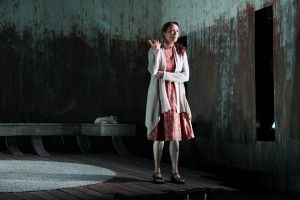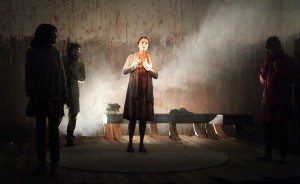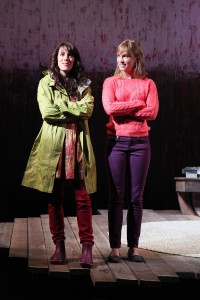A BAD DAY FOR A GREAT PLAY
It’s a problem when the most effective elements of a dramatic show are the sound and visual effects, but such is the case with Cherry Lane Theater’s production of Jon Fosse’s outstanding play A Summer Day, which had the misfortune of being admired and subsequently translated and helmed by Sarah Cameron Sunde. Not merely incapable of getting the actors to realize her puerile vision, Ms. Sunde appears to have little to no understanding of what the play she’s directing is actually about; she seems to read Mr. Fosse’s script – a work rich with themes, subtext, profound insights and observation, gathered into a beautifully stylized poetic form – as though it were the teleplay for some banal made-for-TV movie.
 Karen Allen plays the woman, who lives alone in a secluded house and spends her days gazing out the window at the bay. After a visiting friend (Pamela Shaw) leaves for a stroll, the woman tells us the story of what happened here one summer day twenty or so years ago: The woman (her younger version played by Samantha Soule) lives in the house with her husband Asle (McCaleb Burnett), who spends most of his waking hours out on the bay alone in his rowboat. That day Asle’s wife (the woman) expects her friend (Maren Bush) to visit. As usual Asle goes out on his boat. She tries to dissuade him but to no avail. He invites her to come with him but she declines; she’s afraid of the water, and her friend will arrive any minute. So he goes alone, despite the drizzling rain. As he leaves, his wife gets a dreadful feeling and almost runs out to stop him. Her apprehension intensifies when she subsequently goes to their bedroom and finds that he’s arranged all his clothes very neatly, something he has never done before. Her friend arrives, then later her friend’s husband (Carlo Alban). It gets dark, the bay becomes stormy, yet Asle does not return.
Karen Allen plays the woman, who lives alone in a secluded house and spends her days gazing out the window at the bay. After a visiting friend (Pamela Shaw) leaves for a stroll, the woman tells us the story of what happened here one summer day twenty or so years ago: The woman (her younger version played by Samantha Soule) lives in the house with her husband Asle (McCaleb Burnett), who spends most of his waking hours out on the bay alone in his rowboat. That day Asle’s wife (the woman) expects her friend (Maren Bush) to visit. As usual Asle goes out on his boat. She tries to dissuade him but to no avail. He invites her to come with him but she declines; she’s afraid of the water, and her friend will arrive any minute. So he goes alone, despite the drizzling rain. As he leaves, his wife gets a dreadful feeling and almost runs out to stop him. Her apprehension intensifies when she subsequently goes to their bedroom and finds that he’s arranged all his clothes very neatly, something he has never done before. Her friend arrives, then later her friend’s husband (Carlo Alban). It gets dark, the bay becomes stormy, yet Asle does not return.
 Asle’s fate gets telegraphed to us very early on; pretty much as soon as we learn he intends to go out on his boat in the rain, we know how it will all end. To a certain extent, this foretelling exists in the writing. However, with proper direction our hope for Asle’s safe return could have been kept alive until, say, the middle of the show, thereby creating suspense and drama. Ms. Sunde however directs the play as though everything were a foregone conclusion from the very beginning, failing to conjure even the least bit of tension. In her hands A Summer Day turns into an undramatic, straightforward and very dull story of lost love, perpetual grief and self-imposed isolation. Still, if nothing else, the play’s construction begs the question: If we basically know what happens to Asle long before the play’s climax, then why watch the rest of it? What surprising revelation are we supposed to have at the story’s conclusion? Ms. Sunde doesn’t appear to know, or if she does she’s utterly incapable of communicating it theatrically.
Asle’s fate gets telegraphed to us very early on; pretty much as soon as we learn he intends to go out on his boat in the rain, we know how it will all end. To a certain extent, this foretelling exists in the writing. However, with proper direction our hope for Asle’s safe return could have been kept alive until, say, the middle of the show, thereby creating suspense and drama. Ms. Sunde however directs the play as though everything were a foregone conclusion from the very beginning, failing to conjure even the least bit of tension. In her hands A Summer Day turns into an undramatic, straightforward and very dull story of lost love, perpetual grief and self-imposed isolation. Still, if nothing else, the play’s construction begs the question: If we basically know what happens to Asle long before the play’s climax, then why watch the rest of it? What surprising revelation are we supposed to have at the story’s conclusion? Ms. Sunde doesn’t appear to know, or if she does she’s utterly incapable of communicating it theatrically.
 The revelation in fact concerns Asle’s wife (and the following paragraph would be a spoiler if this element was actually part of the show). Although she and Asle love one another very deeply – in a way they are meant for each other and cannot be apart – they also cannot be together. In the beginning we sense this from Asle, as he only seems to want to be out on his boat. His wife, on the other hand, appears troubled by his distance. She tries to persuade him to stay. She reminds him that he was the one who wanted to move from the city to this isolated house by the water, but now, she observes with sympathy and concern, he seems “…more sad than ever before.” “You wouldn’t’ve liked it/wherever you lived” she continues, “You’d always want/to live somewhere else/That’s just the way you are.” Her reasons for not going on the boat with him seem legitimate, as do her reasons for not running out to stop him, and for not getting the authorities involved when she senses that something bad might have happened. Yet Asle’s disappearance, in an unconscious but very real way, is precisely what his wife desires. Her longing to be with him is more valuable to her than being with him, her idea of him more real to her than he is in the flesh. For her to separate from her husband would be unthinkable; she’d never leave him. Asle living somewhere else, maybe with someone else, would be too awful to imagine. She at once wants him to be with her and not to be with her. Her bliss seems to be in longing for and awaiting his imminent return: He’s out in the boat, alone, and he’ll be back soon – that in-between state makes her, for lack of a better word, happy.
The revelation in fact concerns Asle’s wife (and the following paragraph would be a spoiler if this element was actually part of the show). Although she and Asle love one another very deeply – in a way they are meant for each other and cannot be apart – they also cannot be together. In the beginning we sense this from Asle, as he only seems to want to be out on his boat. His wife, on the other hand, appears troubled by his distance. She tries to persuade him to stay. She reminds him that he was the one who wanted to move from the city to this isolated house by the water, but now, she observes with sympathy and concern, he seems “…more sad than ever before.” “You wouldn’t’ve liked it/wherever you lived” she continues, “You’d always want/to live somewhere else/That’s just the way you are.” Her reasons for not going on the boat with him seem legitimate, as do her reasons for not running out to stop him, and for not getting the authorities involved when she senses that something bad might have happened. Yet Asle’s disappearance, in an unconscious but very real way, is precisely what his wife desires. Her longing to be with him is more valuable to her than being with him, her idea of him more real to her than he is in the flesh. For her to separate from her husband would be unthinkable; she’d never leave him. Asle living somewhere else, maybe with someone else, would be too awful to imagine. She at once wants him to be with her and not to be with her. Her bliss seems to be in longing for and awaiting his imminent return: He’s out in the boat, alone, and he’ll be back soon – that in-between state makes her, for lack of a better word, happy.
Ms. Sunde misses many more nuances of Mr. Fosse’s play, including Asle’s motivations, the precise relationship between the older and younger versions of the woman (the wife), the significance of the other couple (the friends), not to mention those of the play’s stylized, poetic form, which Ms. Sunde castrates completely. Performances suffer greatly as a result. Ms. Allen and Ms. Soule manage well with the tasks they are given, as does Mr. Alban in his limited part. Unfortunately the tasks themselves are so superficial that the characters created are insufficiently layered either to make them relevant or to tell the whole story dramatically; the rest of the cast just seems confused.
If this production has stars, they are Nicole Pearce, the lighting designer, and Leah Gelpe, who did both projection and sound design. Evocative and precise throughout the show, when these three elements come together at the culmination of the second act it makes for a truly powerful visceral experience. The set is by John McDermott and costumes by Deb O.
photos by Sandra Coudert
A Summer Day
Rattlestick Playwrights Theater at The Cherry Lane Theater
scheduled to end on November 25, 2012 EXTENDED through December 8, 2012
for tickets, call 866.811.4111 or visit http://www.rattlestick.org

